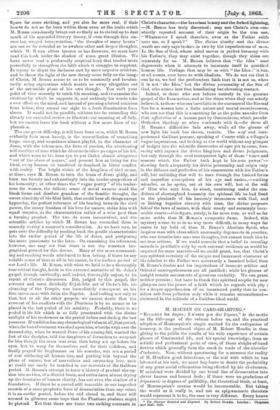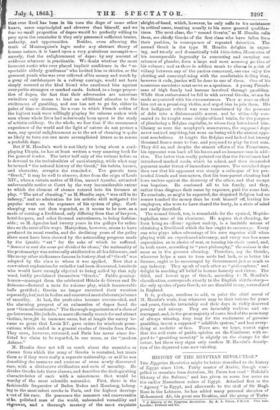M. HOUDIN ON CARDSHARPING.*
" ECIAIREZ lea dupes ; il n'aura pas des fripons," is the motto on the title-page of the volume before us, and the practice/ adoption of Montesquieu's simple method for the extirpation of knavery, is the professed object of M. Robert Houdin in thus giving to the public the results of his wide experience of certain phases of Continental life, and his special knowledge, from an artistic and professional point of view, of those sleight-of-hand devices which generally form the stock in trade of the chevalier d'inclustrie. Now, without questioning for a moment the reality of M. Efoudin's good intentions, or the zeal with which he has laboured at his task, we must beg leave to doubt the probability of any great social reformation being effected by his disclosures. If mankind were divided by one broad line of demarcation into. clever knaves and honest fools ; if there were no gradations of friponnerie or degrees of gullibility, the theoretical truth, at least, of Montesquieu's maxim would be incontestable. But taking the world as it really is, and not as epigrammatic theorists would represent it to be, the ease is very different. Every knave
* The Sharper Detected and Exposed. By Robert Hoturin. Landaa: Chapman and Hall. 1808.
litliat ever lived, has been in his turn the crepe or some other knare, more unprincipled and cleverer than himself, and we prey upon the remainder it they only possessed sufficient brains, fear no small proportion of dupes would be perfectly willing to audacity, and opportunities. Besides, even allowing the truth of Montesquieu's logic under any abstract theory of human nature, it is based upon a very gratuitous assumption— namely, that the enlightenment of dupe 3 by any amount of July. 4,, 18631 evidence whatever is practicable. We doubt whether the most innocent rustic who ever placed implicit confidence in the "re- spectable elderly gentleman". who invited him to skittles, or the greenest youth who was ever relieved of his money and watch by a gang of cardsharpers in a railway carriage, would not have simply sneered at the kind friend who cautioned him against over-polite strangers or marked cards. Indeed, to a large propor- tion of dupes, the fact that their adversaries are notorious swindlers only seems to lend an additional stimulus to the excitement of gambling, and one has not to go far, either in point of time or distance, for a case in which French nobles of the highest rank were willingly playing for ruinous stakes with men whose whole lives had notoriously been spent in the study of artistic robbery. On the whole, we fear that if the commonest experience of the world and the light of natare do not protect a man, any special enlightenment as to the art of cheating is quite as likely to turn out one more accomplished knave as to rescue a probable dupe.
But if M. Houdin's work is not likely to bring about a card- playing Utopia, he has at least written a very amusing book for the general reader. The latter half only of the volume before us is devoted to the technicalities of card-sharping, while what may be termed "the natural history of the Greek," his habits, haunts, and character, occupies the remainder. The generic term "Greek," it may be well to observe, dates from the reign of Louis XIV., when a certain native of Hellas, named Apoulos, attracted unfavourable notice at Court by the very inconsiderable extent to which the element of chance entered into his fortunes at play. "The art of cheating," as M. Houdin says, " was still in its infancy," and no admiration for his artistic skill mitigated the popular wrath on the exposure of his system of play. Card- sharping was not then regarded, as it seems to be now, as a mode of earning a livelihood, only differing from that of lawyers, hotel-keepers, and other licensed extortioners, in being fashion- able ; so M. Apoulos had twenty years in the galleys for reflec- tion on the error of his ways. Martyrdom, however, seems to have produced its usual results, and the declining years of the galley slave must have been cheered by the astounding progress made by the ignoble " art " for the sake of which he suffered. " Souvent ce sont des noms qui decident les choses," the nationality of the protomartyr was universally attributed to all his followers, and like many other nicknames famous in history, that of "Greek" was adopted by the class to whom it was applied. Now that a convenient euphemism for swindler had been discovered, hundreds who would have strongly objected to being called by that ugly word, boldly proclaimed themselves "Greeks." Public gaming- houses—amongst them the celebrated Hotels de Gevres and De Soissons—fostered a taste for ruinous play, which innumerable hells gratified ; Greeks no longer exercised their vocation separately, b ut:met in bodies and concerted most elaborate:schemes of rascality. At last, the profession became overcrowded, and the alarming prospect of an exhaustion of dupes faced the new "Grteculi esurientes." The thorough organization of a class of go-betweens, like jackals, to more effectually search for and attract victims, brought in immense sums, but at length the outcry be- came so great that Louis XV. gave orders for wholesale prose- cutions, which ended in a general exodus of Greeks from Paris. They soon, however, returned, and Paris has never since for- feited her claim to be regarded, in one sense, as the ".modern Ath,ens."
M. Houdin does not tell us much about the countries or classes from which the army of Greeks is recruited, but treats them as if they were really a separate nationality, or as if he was describing the manners and customs of some newly discovered race, with a distinctive civilization and code of morality. He divides Greeks into three classes, and describes the distinguishing characteristics of each with a minuteness that would be .worthy of the most scientific naturalist. First, there is the fashionable frequenter of Baden Baden and Homburg, belong- ing to the most select cercles in Paris, and the highest develop- went of his race. He possesses the manners and conversation ct hr.. polished man of the world, unbounded versatility and rkgrowilai and a thorough mastery of the most exquisite .sfeight-of:liand, which, however, he only calls to his assistance in critical cases, trusting. usually to his more general qualifica- tions. The next class, the" nomad Greeks," as IL Houdin calls them, are chiefly Greeks of the. first class who have fallen front their position, in consequence of repeated detection. The nomad Greek is the type M. Houdin delights in expos- ing, and tersely and dramatically told historiettes, illustrative of his incomparable ingenuity in concerting and. carrying out schemes of plunder, form a large and most amusing po:-tion or his volume ; and as there is seldom much to choose in paint of
villany between any of the parties concerned, one can enjoy the plotting and counterplotting with the comfortable feeling that, however it ends, justice will be done to one of them. One of his numerous anecdotes must serve as a specimen. A young.French- man of high family had become involved' through gambling. While thus embarrassed he fell in with several Greeks, whout he made acquainted with his circumstances. They at once marked him out as a promising victim, and urged him to join them. His first indignant refusal was soon transformed by the pressure of debt into a dishonourable assent, and he ultimately con- sented to be taught some sleight-of-hand tricks, for the purpose of plundering a Belgian capitalist, to whom they introduced him.. Clumsy as were the neophyte's manceuvres, the supposed dupe never noticed anything, but went on losing with the utmost appa-
rent nonchalance. At length the Belgian said he had but twenty thousand francs more to lose, and proposed to play for that sum..
They did so, and despite the utmost efforts of the Frenchman, his opponent won back all his losses and an immense sum in addi- tion. The latter then coolly pointed out that the Frenchman had introduced marked cards, which he seized, and then demanded payment under threat of immediate exposure. The wretched dupe then saw that his opponent was simply a colleague of his pre- tended friends and instructors, that his transparent cheating had been useless against the dexterity of the other, and that escape was hopeless. He confessed all to his family, and they, rather than disgrace their name by exposure, paid the sums lost.
To conclude, as might be expected, the disguised Belgian had ne sooner touched the money than he took himself off, leaving his. employers, who were to have shared the booty, in a state of mind' not easily described.
The nomad Greek, too, is remarkable for the cynical, Mephis- tophelian tone of his character. He argues that cheating, far from being an OfferIC3 against society, is a laudable means of
obtaining a livelihood which the law ought to encourage. Every one who plays takes advantage of his own superior shill when playing with an experienced adversary, and every one has some
superstition as to choice of seat, or turning his chair tound, and, in both cases, according to "pure philosophy," the animus is the same as in the grossest cheating. Therefore, say the Greeks, whatever helps a man to turn aside bad luck, or to better his fortune, ought to be encouraged by Government just as mu.ch as.
any industry. They speak of each other as "philosophers," and delight in mocking all belief in human honesty and virtue. The third, and lowest type of Greek, according te M. Houdin's classification, corresponds exactly to the English skittle-sharp- the only species of pure Greek, we are thankful to say, naturalized in England.
It is, perhaps, needless to add, to point the chief moral of M. Houdin's work, that whatever may be their fortune for years and years, Greeks invariably end their days in richly deserved poverty and misery. They are invariably reckless and ex- travagant, and, in the great majority of cases, tired of the monotony of always winning, they long for the excitement of genuine gambling, invent a supposed "infallible system," and lose every- thing at roulette or faro. There are, we hope, recent signs that the evil state of public opinion on the Continent with re- gard to "gambling morality" is slightly on the change for the better, but these very signs only confirm M. Houdin's descrip- tion of the depraved tone now existing.































 Previous page
Previous page